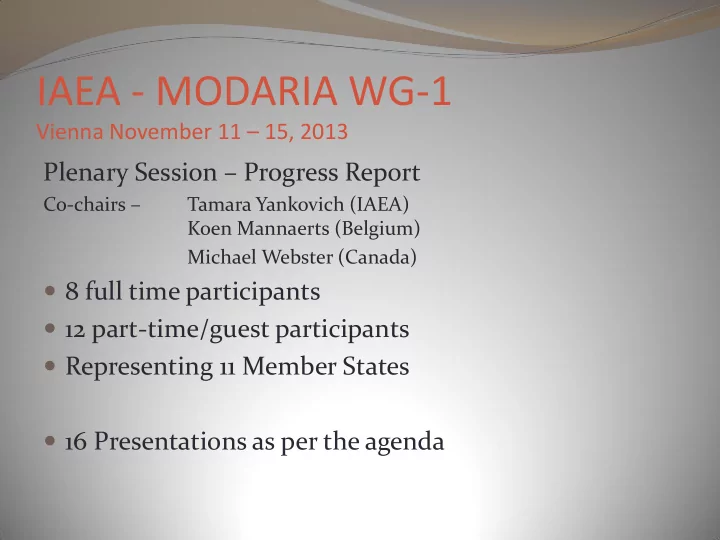

IAEA - MODARIA WG-1 Vienna November 11 – 15, 2013 Plenary Session – Progress Report Co-chairs – Tamara Yankovich (IAEA) Koen Mannaerts (Belgium) Michael Webster (Canada) 8 full time participants 12 part-time/guest participants Representing 11 Member States 16 Presentations as per the agenda
WG1 Objectives (modified from May 2012 document) Analyze the decision- aiding process based on experience gained from past radiological emergencies and remediation efforts (e.g., post-Chernobyl; legacy sites) Extract lessons learned in terms of social, economic and environmental costs Review and compare existing decision-aiding models Prepare case studies for comparison of decision-aiding models Provide recommendations on how to improve the decision-aiding process for remediation planning IAEA - MODARIA WG 1 (November 11-15, 2013)
MODARIA WG1 Draft Work Plan for Vienna 2013 Information Gathering on Decision-Aiding Process presentation made discussions Review Existing Information presentations Populate Template Identifying Key Attributes Discussions Working demonstration of MCDA Focus group work Case Study Analyses One case study developed (awaiting application to framework) others being considered Application of Decision Aiding Models to Case Studies (future) NEW – Development of Technical Report Series (TRS) document (future) IAEA - MODARIA WG1 (November 11-15, 2013)
MODARIA WG-1 - Vienna 2013 Outputs TRS Development – Draft TOC Decision aiding frameworks, processes & tools for the remediation of contaminated environments Scope and objectives of document 1. Introduction to decision aiding theory and application 2. 3. Main principles and general approach of remediation Framework Core elements Issues to be considered in option assessments/comparisons & their attributes 4. Stakeholder involvement 5. 6. Option ‘comparison’ methods 7. Case studies: applied to decision aiding frameworks & tools Lessons learned Conclusions 8. Appendix 9. Annotated Bibliography Definitions IAEA - MODARIA WG1 (November 11-15, 2013)
MODARIA WG-1 - Vienna 2013 Outputs Developed an independent process framework for the selection and implementation of remedial options. Based on actual methodologies applied to remediation as described during case studies presented during Kiev Interim Meeting. IAEA - MODARIA WG1 (November 11-15, 2013)
IAEA - MODARIA WG1 (November 11-15, 2013)
Framework agrees with information provided in WS-G3.1 IAEA - MODARIA WG1 (November 11-15, 2013)
MODARIA WG-1 - Vienna 2013 Outputs • Initiated development of an attributes list to support decisions at the various phases of remediation • The attributes are those critical elements that must be considered in developing a defensible outcome or decision • Each phase of the remediation process framework will require many attributes be considered before moving to the next phase. IAEA - MODARIA WG1 (November 11-15, 2013)
MODARIA WG-1 - Vienna 2013 Outputs Example of attributes that will feed decision aiding process IAEA - MODARIA WG1 (November 11-15, 2013)
MODARIA WG-1 Path Forward (June 2014) summarize literature related to the application of decision aiding theory and completion of an annotated bibliography gather relevant IAEA documentation and present in a top- down format develop a matrix of attributes to be considered in support of decisions required during various phases of remediation presentations regarding participating Member States programs related to stakeholder involvement Video/teleconference meeting (January 2014) Interim Meeting – tentatively scheduled for Prague (end of June 2014) IAEA - MODARIA WG1 (November 11-15, 2013)
MODARIA WG-1 - Path Forward (2015) Case Studies Chernobyl One other (NORM, U mine/mill, Wild Boar)? Preparation of TRS document IAEA - MODARIA WG1 (November 11-15, 2013)
MODARIA WG-1 - Vienna 2013 Outputs Thank you We look forward to seeing everyone in Vienna in 2014 Questions? IAEA - MODARIA WG1 (November 11-15, 2013)
Recommend
More recommend